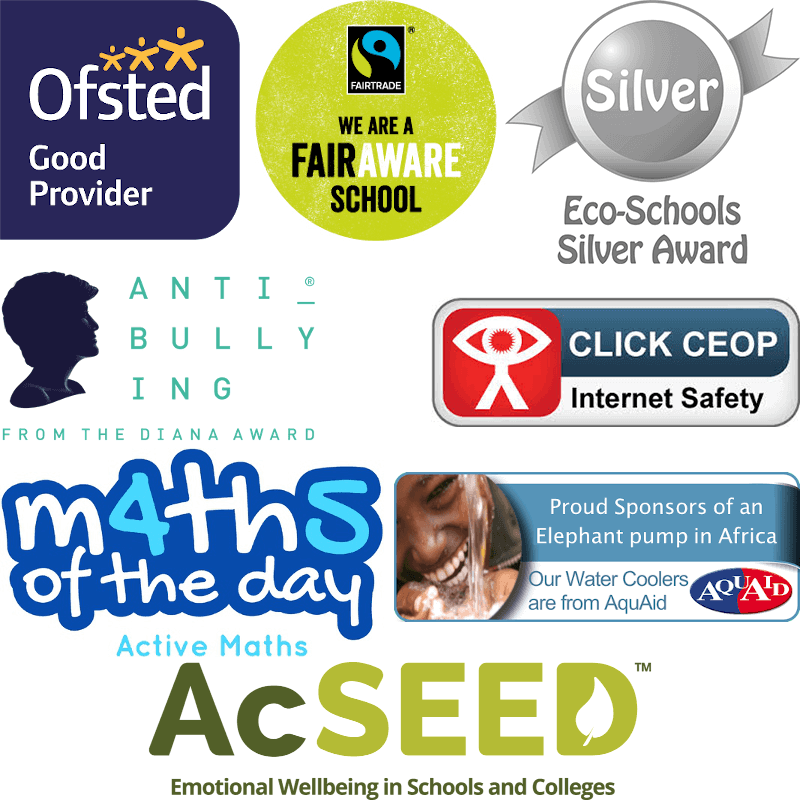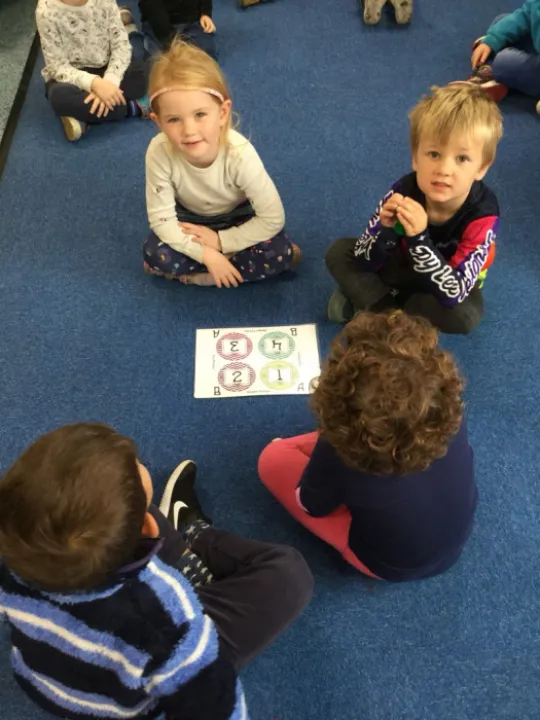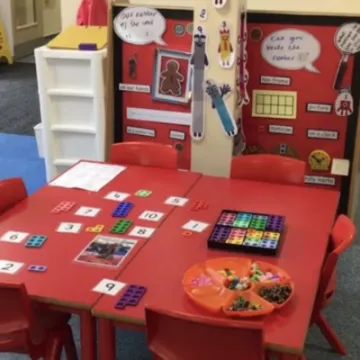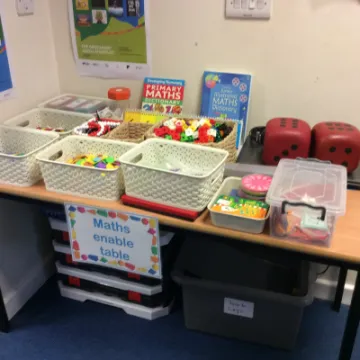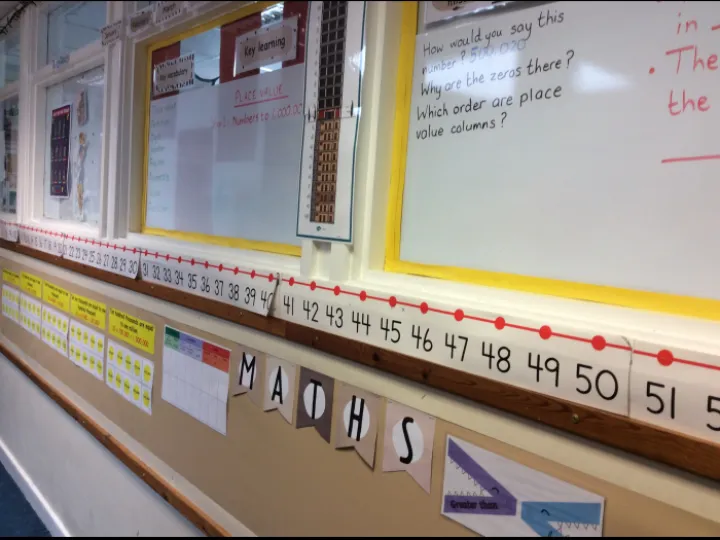Mathematics
Maths – Resources for parents:
1. Access to White Rose videos so that parents can revise a lesson at home and see what their child is being taught in class. These videos will show parents the strategies which have been taught by the class teacher, but will enable parents to go back over the main teaching points with their child. Parents can access any video for any year group by clicking here . All are free to access. For each year group, the scheme of learning includes an overview of the maths that your child should be learning at any point in the year.
Each year is split into three terms (autumn, spring and summer), and each term comprises individual blocks of learning about a particular topic.
You'll notice that we spend lots of time building strong number skills in Key Stage 1 and Key Stage 2. These essential core skills lay a solid foundation for more complicated learning later on.
2. Access to '1-minute maths' on an app or through a browser. This is an app from the White Rose Maths Hub which the school works with to deliver the maths curriculum. Parents should access the app through the app store.
1-minute maths offers children engaging and easily accessible practice in basic number. There's no specific route or starting point. Having chosen a topic, each user answers a series of randomly generated questions (a different set of questions every time means they learn the concept, not a sequence of answers).
When the one minute's up, the questions are automatically marked and presented on a breakdown screen, giving instant feedback on how they've done. If they're struggling with a question, a 'Hint' button reformats the question as a familiar manipulative display that mirrors the approaches used in the White Rose Maths schemes of learning.
3. Access to Times Tables Rockstars: All children in the school have been provided with a login to TTRockstars and Numbots. These apps can be downloaded from the app store or through a browser. Both TTRockstars and Numbots allow the children to play engaging games which help them to practise recall of key number facts.
Why you teach it – your purpose of study
The national curriculum for mathematics intends to ensure that all pupils:
1. Become fluent in the fundamentals of mathematics, including through varied and frequent practice with increasingly complex problems over time, so that pupils develop conceptual understanding and the ability to recall and apply knowledge rapidly and accurately.
2. Reason mathematically by following a line of enquiry, conjecturing relationships and generalisations, and developing an argument, justification or proof using mathematical language.
3. Can solve problems by applying their mathematics to a variety of routine and non-routine problems with increasing sophistication, including breaking down problems into a series of simpler steps and persevering in seeking solutions.
Mathematics is an interconnected subject in which pupils need to be able to move fluently between representations of mathematical ideas. The programmes of study are, by necessity, organised into apparently distinct domains, but pupils should make rich connections across mathematical ideas to develop fluency, mathematical reasoning and competence in solving increasingly sophisticated problems. Our curriculum ensures children apply mastery skills in their maths and in Science and other subjects. We follow the White Rose maths scheme and are part of the Cheshire and Wirral Maths Hub as a 'Sustaining Mastery' school.
The expectation is that the majority of pupils will move through the programmes of study at broadly the same pace. However, decisions about when to progress should always be based on the security of pupils' understanding and their readiness to progress to the next stage. Pupils who grasp concepts rapidly should be challenged through being offered rich mastery and sophisticated problems before any acceleration through new content. Those who are not sufficiently fluent with earlier material should consolidate their understanding, including through additional practice, before moving on.
Design
What you teach – your programme(s) of study
When teaching mathematics at Audlem St. James, we intend to provide a curriculum which caters for the needs of all individuals and sets them up with the necessary skills and knowledge for them to become successful in their future adventures. We aim to prepare them for a successful working life. We provide teaching on financial literacy so that the children know how to manage their money as they mature, including how to save, manage a bank account and how to pay for things. We incorporate sustained levels of challenge through varied and high-quality activities with a focus on fluency, reasoning and problem solving. Using a Mastery model, pupils are required to explore mathematics in depth, using mathematical vocabulary to reason and explain their workings. A wide range of mathematical resources are used and pupils are taught to show their workings in a concrete, pictorial and abstract form wherever suitable. They are taught to explain their choice of methods and develop their mathematical reasoning skills. We encourage resilience, adaptability and acceptance that struggle is often a necessary step in learning. Our curriculum allows children to better make sense of the world around them relating to the pattern between mathematics and everyday life. Lessons may include collaboration, but sustained focus and concentration are key to success. We intend to reduce any gaps resulting from school closures through recapping and teaching objectives from previous year groups, where necessary, informed by baseline assessments carried out at the start of each unit.
We intend to provide all children with the mathematical skills and knowledge to reach their potential in life. We aim to ensure that children with special educational needs are at the heart of our teaching, and that all children are encouraged to become automatic with the facts and methods to solve problems. We therefore aim to have a systematic approach using a mastery model so that children are taught the mathematics they need for the next stage so that they do not stay behind their peers.
Fluency: We intend for all pupils to become fluent in the fundamentals of mathematics, including through varied and frequent practice with increasingly complex problems over time, so that pupils develop conceptual understanding and the ability to recall and apply knowledge rapidly and accurately. We intend that children are secure in their knowledge of number facts and in their recall and use of calculation strategies, through regular retrieval so that they do not forget key knowledge. Our pupils are encouraged to use the most efficient methods of mathematics, and only use informal methods for as long as is necessary to achieve conceptual understanding.
Reasoning: We intend for all pupils to reason mathematically by following a line of enquiry, conjecturing relationships and generalisations, and developing an argument, justification or proof using mathematical language. We intend that they speak in complete sentences and use accurate mathematical explanations in their responses.
Problem solving: We intend for all pupils to solve problems by applying their mathematics to a variety of routine and non-routine problems with increasing sophistication, including breaking down problems into a series of simpler steps and persevering in seeking solutions. We intend to teach children problem-solving skills by ensuring that the necessary facts and methods are secure first, followed by sufficient practice so that solving problems does not cause cognitive overload.
Vocabulary: We intend for all pupils to be immersed in a vocabulary-rich environment where discussion allows for understanding and deeper thinking. We intend that children use the vocabulary on display and used by their teachers, in their own sentences when explaining their thinking.
EYFS: We intend that our EYFS teaching will include greater clarity to counting and comparing quantities in the Numerical Patterns ELG in line with the Government's focus on these as the strongest predictor for later maths outcomes. We intend to strengthen the teaching of early numeracy so that all children, particularly those from disadvantaged backgrounds, are able to start year 1 with a strong and confident foundation in number. Learning will continue to cover shape, space and measures, as part of a well-rounded curriculum, as set out in the revised mathematics educational programme.
Parental engagement: Throughout lockdowns, parents were given free access to the White Rose home learning videos which enabled them to see how methods are taught in school. We intend that parents continue to access these videos to support their child at home. We also intend to develop the maths page on our new website so that parents are provided with resources and signposted to ways to support their child. Parents are also updated on their child's progress through parent consultation meetings twice a year, and termly for SEND children. We also intend to provide greater clarity on what is taught each year and provide guidance and updates on how best to support children at home.
CPD: We intend that all teachers are kept up to date with relevant current research and methods, and that new staff are inducted into the mastery model. We also intend that staff learning needs are taking into consideration when planning CPD to ensure that all staff involved in the teaching of maths, have a deep subject and pedagogical knowledge.
Outdoor learning: We have been continuously improving our provision for outdoor learning since our last Ofsted inspection and have developed outdoor learning environments for EYFS, Y1 and Y2. We intend that Y3 develop their own dedicated outdoor learning space, but that all class teachers use suggestions within the White Rose scheme as and when they are identified.
Delivery
How you teach it – your delivery of the above
Maths is taught daily and includes retrieval of previously taught content.
White Rose mastery model: Every class from EYFS to Y6 follows the White Rose scheme of learning which is based on the National Curriculum. Lessons may be personalised to address the individual needs and requirements for a class but coverage is maintained. In order to further develop the children's fluency, reasoning and problem-solving, we use a range of planning resources including those provided by the NCETM and NRICH to enrich our children's maths diet. We teach through the mastery model which has five key ideas:
- Coherence -our curriculum has a coherent progression between concepts and between year groups
- Representation and structure – we use the CPA approach to make the structure of the mathematics visible and accessible
- Mathematical thinking – we intend that children make links and see relationships
- Fluency – we practise and rehearse to ensure knowledge is retained and to a level of automaticity
- Variation – we intend that procedural variation is used to enable children to make connections and see patterns, and intend that conceptual variation is used to present the same concept in different ways to ensure the concept is embedded.
Concrete Pictorial Abstract (CPA): We implement our approach through high quality teaching, delivering appropriately challenging work for all individuals. To support us, we have a range of mathematical resources in classrooms including Numicon, Base 10 and counters (concrete equipment) and number lines. These are placed on the maths 'enable tables' or in a maths area accessible to the children. When children have grasped a concept using concrete equipment, images and diagrams are used (pictorial) prior to moving to abstract questions. Abstract maths relies on the children understanding a concept thoroughly and being able to use their knowledge and understanding to answer and solve maths without equipment or images. How a child has accessed the maths is recorded on the layered learning objectives.
Variation: Within our scheme of work, children are presented with carefully sequenced questions which scaffolds their learning so that they can see connections and make links. Concepts are also presented in a variety of ways and representations so that the concept is fully explored. Teachers also make use of the ready-to-progress materials to support and deepen the concept.
Mastering Number: Research shows that children need to develop good 'number sense' between the ages of 4 and 7. We have therefore introduced 'Mastering Number' which is delivered through the NCETM. This programme is taught in EYFS, Year 1 and Year 2 and is also delivered to those children in lower key stage two who are significantly behind their peers. In Y1 and Y2, class teachers deliver a discrete 15-minute session four days a week which focuses on the five key areas of:
- Subitising
- Cardinality, ordinality and counting
- Composition
- Comparison
- Addition, subtraction and number facts
In EYFS, mastering number constitutes the main part of the directed teaching four days a week, and on the fifth day, content is drawn from the White Rose programme to cover the areas not within Mastering Number. This programme has run for one academic year, with teachers contributing to an online community to share and improve practice. The school uses Rekenreks to provide a hands-on experience to deepen the learning.
Maths Hub: Our school has been delivering a mastery model through the maths hubs for six years. We are now considered a 'sustaining mastery' school and have recently joined the Cheshire and Wirral Maths Hub. The focus for this year will be to improve an area of the mastery model which may need to be embedded further and, for this year, we shall be improving fluency across the school. We shall do this by explicitly teaching number facts every day and measuring attainment closely each term using data on Times Tables Rockstars (referred to as heatmaps) following an assessment period within class. Class teachers in Years 5 and 6 will also assess which numbers facts still need to be secured and design a programme to enable children to learn and secure them. Children will be rewarded for effort and progress through certificates and badges throughout the year.
Retrieval practice: All classes engage in daily retrieval of previously-taught content to ensure that knowledge is retained and embedded. This time should include retrieval of declarative knowledge such as keys facts and language from the previous lessons, as well as procedural knowledge such as a strategy previously taught. This will be evidenced through a combination of recording in books as well as on whiteboards or through games. Teachers will make use of the daily 'Flashback four' within the White Rose scheme at the start of each lesson. Teachers will also update their maths display to help the children to remember and do more independently, and these will also serve as a form of revision.
Vocabulary: Teachers expect children to answer in complete sentences and use taught mathematical vocabulary and sentence structures. Examples of the sentence structures or stems as well as maths vocabulary are displayed in all classrooms for children to refer to. The displays are updated as learning progresses.
Number facts: In order to reinforce individual children's recall of key number facts, we utilise Times Tables Rock Stars for multiplication practice, application and consolidation. We also utilise Numbots for recall of addition and subtraction facts. Children are provided with logins in order to practise in class, but are also set challenges and homework to practise at home. The order which children learn the facts are:
Year 1: Count in multiples of 2, 5 and 10. Recall and use all doubles to 10 and corresponding halves.
Year 2: Recall and use multiplication and division facts for the 2, 5 and 10 multiplication tables, including recognising odd and even numbers.
Year 3: Recall and use multiplication and division facts for the 3, 4 and 8 multiplication tables.
Year 4: Recall and use multiplication and division facts for the multiplication tables up to 12x12.
Years 5 & 6: Revision of all multiplication tables and division facts.
Number facts are also taught daily in each class in KS2; in KS1 this is included as part of the Mastering Number programme.
The school will also be utilizing the app 'One-minute maths' from White Rose to help develop mental calculation with all four operations including subitising. The app can be used in the classroom, but also set as homework. It will be advertised to parents by the maths lead.
Enrichment activities: We invite visitors from local banks and building societies to work with the children to develop their financial literacy. This is also included in our RSE curriculum where we teach children about the world of work and the idea of enterprise, as well as how to use money and pay for things. We also organise trips to apply mathematical thinking such as visits to Newcastle-under-Lyme College to build and programme Lego robots. We take part in mathematics competitions such as the 'Primary Maths Challenge' to stretch our most able children, but we include all children in upper key stage children so that they can work together to solve challenging problems. The children also take part in national initiatives, such as the census to learn how mathematics plays a role in our democracy.
Misconceptions: Emphasis will be made on anticipating and addressing misconceptions, and these are identified within the teacher guidance provided in the White Rose scheme. Misconceptions are threaded throughout every lesson, often using the cartoon character 'Tiny' the turtle, and are displayed on the classroom maths wall.
Parental engagement: A new page on the school website will be developed once the upgrade has taken place. Children and parents will be able to access resources which will support their children with their learning. Parents may also be provided with 'maths boxes' which contain various manipulatives and may help vulnerable children with their learning at home. Teachers identify who may benefit from borrowing these boxes and provide them on loan for short periods.
CPD: The maths lead is a member of a teacher research group as part of the school's involvement in the maths hub. Information is then disseminated through staff meetings and INSETs. New teachers are also provided with access to online training in: Conceptual and procedural variation, the CPA approach and Bar Modelling. Teachers in EYFS, Year 1 and Year 2 are also attending online research groups through their participation in the Mastering Number programme, which will enhance their skills and knowledge in teaching Number.
Achievement
So what – your evaluations of the above
At the end of each year we expect the children to have achieved Age Related Expectations (ARE) for their year group. Some children will have progressed further and achieved greater depth (GD). Children who have gaps in their knowledge receive appropriate support and intervention.
Since the introduction of the mastery model and the White Rose scheme of work, children have been exposed to a wider range of representations and carefully sequenced learning. Most children have become more fluent in using manipulatives and know how to use them to help them to learn maths independently. Teacher workload has also reduced as resources and medium-term plans are provided as well as daily Powerpoint slides which detail the daily learning – these serve as the short-term planning. Teachers adapt the scheme to suit their class and supplement it with recommended resources. Teachers are clear on the small steps needed to ensure a coherent progression. Teachers are now more knowledgeable of their curriculum and also of the key areas which help the children to progress to the next stage in their education.
Membership of the maths hub has enabled the school to access high-quality CPD such as observing teachers from China, and to current research which has enhanced the quality of teaching, for example, learning different ways to teach times tables, or questions to use to promote reasoning. It has also enabled staff to network with other schools and compare practice.
Daily retrieval has always been a part of the maths lesson at our school, but making it explicit and making reference to declarative and procedural knowledge is providing children with dedicated time to practise using specific prior knowledge. This is particularly helpful for children who need more time to secure a concept, fact or procedure. One area of retrieval is the meaning of mathematical vocabulary. Children are beginning to become more fluent in their use and understanding of terminology, and this will continue to be embedded. By using 'Flashback 4' questions at the start of the lesson, children should remember more and build on previous knowledge.
In previous years, the teaching of number facts and the use of TTRS and Numbots was supporting children to develop fluency to automaticity. Teachers can refer to the 'heatmaps' to analyse which times tables need further attention. However, since lockdowns, some gaps have arisen so staff are reinforcing the learning in lessons and through homework. This will be monitored by the maths lead. In Year 4, the children made extensive use of TTRS and achieved well in their Multiplication Check in 2022.
Enrichment activities have encouraged children to see mathematics as a subject which can enable them to create, design and take pleasure in. All of the workshops and visits have been well-received by children and staff, and has allowed all children to apply mathematics in a real-life context, as well as promote confidence and enthusiasm. Some of the trips we usually provide were suspended in 2022, but we hope to introduce them in 2023.
The maths lead has created a revised book scrutiny criterion (Flick and Fix) which focuses on current priorities:
Maths is being taught daily and work shows that pupils are building on prior knowledge.
Misconceptions are being 'picked' up' and addressed.
Pupils are using and applying subject specific vocabulary accurately.
Books contain work that is pitched at the appropriate year group level, but show variation for those who are working significantly below year group level.
Books show that pupils are being challenged.
Books show the development of problem-solving strategies.
Daily retrieval is developing and teachers have been reminded of this. KS1 have run mastering number sessions for one academic year and are pleased with how it is improving children's ability to calculate. Time for rehearsal is also developing. Teachers are aiming to ensure coverage, but still need to ensure that fluency is developed first. Many classes are using TTRS in class and as homework, but this still needs to be embedded within the lesson.
Our Partners
